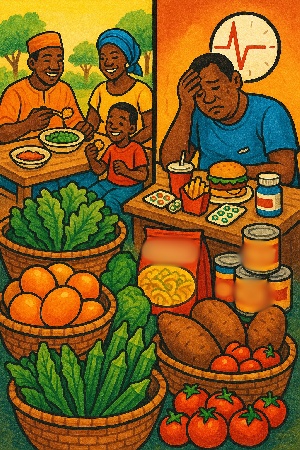- Home - News
- Elections 2024
- News Archive
- Crime & Punishment
- Politics
- Regional
- Editorial
- Health
- Ghanaians Abroad
- Tabloid
- Africa
- Religion
- Photo Archives
- Press Release
Health News of Friday, 16 May 2025
Source: www.ghanawebbers.com
The Potential of Local Foods in Hypertension Prevention and Treatment
World Hypertension Day is Here!
Hypertension, or high blood pressure, is a major global health issue. It is one of the leading causes of death worldwide. In Ghana, it is commonly referred to as "BP."
Around 1.3 billion people globally have hypertension. Two-thirds of these individuals live in low- and middle-income countries. In West Africa, over 35% of adults are affected by hypertension. Rates are rising in both urban and rural areas.
This increase leads to more strokes, heart disease, and kidney failure. The rise in hypertension is linked to changing lifestyles due to urbanization and sedentary jobs. Dietary changes also play a significant role.
Traditional diets rich in fruits, vegetables, and whole grains are declining. More people are consuming processed foods high in salt, sugar, and unhealthy fats.
Recent research published in the *Journal of Hypertension* explores dietary patterns in West Africa and their link to hypertension risk.
What the Science Says
Researchers reviewed 31 studies involving over 48,000 adults from West Africa. Their findings confirm that certain diets increase hypertension risk.
Diets high in salt, saturated fats, processed snacks, and red meat raise this risk significantly. On the other hand, diets rich in fruits and vegetables lower the risk substantially.
Fruits and Vegetables Reduce Risk
High consumption of fruits and vegetables lowers hypertension risk by 20%. These foods are rich in potassium, antioxidants, and fiber. They help regulate blood pressure effectively across different countries and age groups.
Salt Increases Risk
High salt intake raises hypertension risk by 25%. While salt is common in traditional dishes, excessive use can be harmful. Hidden salt is often found in processed foods like instant noodles and canned goods.
Junk Food Poses Greater Risk
Eating junk food increases the chance of hypertension by 41%. Fried items, sugary snacks, and fast food contain unhealthy trans fats and sugars that strain the cardiovascular system.
Excessive Intake of Red Meat Is Risky
High red meat consumption raises hypertension risk by 51%. High dietary fat intake increases this risk by 76%. These fats contribute to arterial stiffness and higher cholesterol levels.
Alcohol Adds to the Problem
Even moderate alcohol consumption raises hypertension odds by 17%. This supports public health advice to limit alcohol intake.
The Local Advantage
West Africa has many locally available foods that can help combat high blood pressure:
- Leafy greens like kontomire and bitter leaf
- Vegetables such as okro and pumpkins
- Fruits including avocados and mangoes
- Whole grains like brown rice
- Legumes such as beans
These foods are nutritious, culturally familiar, widely accepted, and often affordable when in season.
Promoting these foods can help reduce hypertension rates significantly.
Final Thoughts
The fight against hypertension requires more than just medication. Diet must be central to this effort—especially local traditional foods.
Choosing local produce over processed snacks can improve blood pressure levels. Public health campaigns can encourage healthier eating habits within communities.
On a personal level, meaningful change starts with daily choices about food. Incorporating fresh fruits and vegetables into meals empowers individuals to take control of their health.
Small steps like choosing whole grains or cooking at home using local ingredients can set a positive example for others around you.
For more educational content on nutrition join our WhatsApp channel or email us at [email protected].
Written by Dr. Laurene Boateng (PhD, RD), Registered Dietitian at the University of Ghana.
She founded Full Proof Nutrition for reliable healthy eating advice.
Reference:
Batubo N.P., Moore J.B., & Zulyniak M.A. (2023). Dietary factors and hypertension risk in West Africa: a systematic review *Journal of Hypertension*, 41(9), 1376–1388.
Sports

2024/25 Ghana Premier League Match Report: Bibiani Goldstars humiliate Accra Lions in final game to
Business








